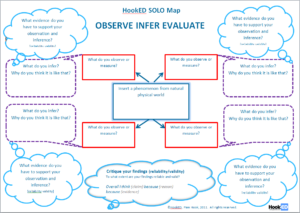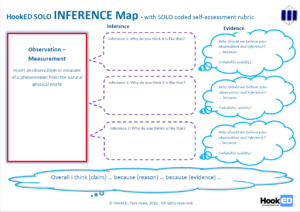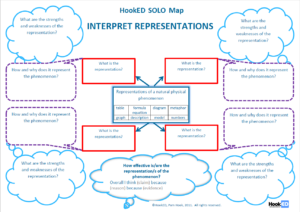The New Zealand Curriculum Essence statement for science has a brusque confidence and certainty about it. The words know how, they know when and they know why. You can almost feel the words crossing arms with each other, locking hands in front and preparing to move across the river in a series of deliberate steps parallel to the direction of the current.
In science, students explore how both the natural physical world and science itself work so that they can participate as critical, informed, and responsible citizens in a society in which science plays a significant role. New Zealand Curriculum Essence Statement
However, those charged with helping students think like scientists (all that exploring and participating and significance) will tell you that the experience is uncertain and risky it is in truth closer to trying to make sense of the SpongeBob SquarePants quote below than the confidence in the NZC Essence statement words acknowledge.
You mean to say theyve taken what we thought we think and made us think we thought our thoughts weve been thinking our thoughts we think we thought… You think? SpongeBob SquarePants
Helping students think like scientists is uncertain work. The problem is that students arrive with well established mental models about the natural and physical world. Mental models that have been French polished by everyday experiences, religious beliefs, the use of words that mean different things in science to what they do in everyday life, and by falsehoods and folklore shared as fact in popular songs, social media and advertising.
This disconnect between what has been personally constructed over years and what a science teacher attempts to confront and challenge in moments is revealed when the students who love science and can quote a stunning range of science facts and information (instrumental knowledge) fail to answer questions designed to test relational and conceptual understanding. This uncertainty for educators is exacerbated because the mental models students hold (that do not necessarily represent how a scientist understands the world) are remarkably hard to shift.
There is nothing new in this. There have been many initiatives to deepen science understanding over the years. My favourite was the LISP The New Zealand Learning in Science Project.
The Five Science Capabilities are a more recent attempt to deepen New Zealand student understanding in science . (Refer Dr Rose Hipkins NZCER)
Many client schools are planning learning experiences that help students become more capable when they:
- Gather and interpret data
- Use evidence
- Critique evidence
- Interpret representations
- Engage with science
I offer the following HookED SOLO Maps as examples of strategies that help students make meaning of the science capabilities.
Contact me if you would like the original files.








{ 15 comments… read them below or add one }
Hi
I love the idea of Solo the PE dept are using it and I want to try to bring it into Maths rather than just use Blooms.
Could you email me your flyer, but also the HookED SOLO Maps so that i can show people what can be done.
Thanks
Barbara
Hi Barbara
Found these to be very interesting. could I please have the original copies
Nga Mihi
Jo-Ann
These are awesome, really makes thinking visible. I would love to have a copy of these for my science class.
I think this resource is a mazing, I would really love a copy of these so I can share with my staff.
Thank you
Lorraine
Hi Pam
This is really useful. I would love a copy of your resources for my class and for my school.
Thank you
Fiona.
These would be fantastic for my junior science classes who we are experimenting with more capabilities teaching rather than content.
I would love the original files please.
Thanks,
Melissa
Morning I would love to have a copy of your resources for my class. Thanks so much. Mandy
Hi, this resource is very good to teach science. Can you email me the original templates?
Thank you.
These are great, please may I have a copy as I’d like to introduce this into my teaching.
Can I please have original copies of these? Thanks in advance!
Hi Pam,
I find your sharing very useful. Could I request for the original files, so that I can use it in my classroom?
Thank you and I really appericate the sharing!
Cheers,
Naomi
Hi can I please get copies if info above and also would love some examples of science and pe
Can i have a copy of these useful resources please.
Very thanks you!
Can i have a copy of these useful resources please.
Kia ora Pam!
Ive recently changed jobs and am now a facilitator with the House of Science. (Dream job after over 30 years in the classroom!)
I was excited to see I have a couple of schools who use SOLO.
Can I ask you for HookED SOLO Maps with strategies that help students make meaning of the science capabilities? I might have had these a while back but cant find them
Many thanks in advance and trust you are well!
🙂 Carol B